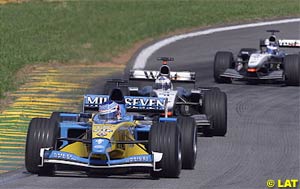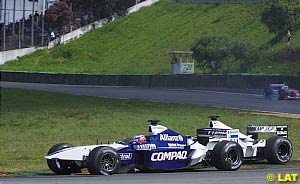
This week's Grapevine brings you |
Coming away from Brazil, the Renault team are feeling very positive about their upgraded objective for the season - which is to finish in front of McLaren, as one of the top three teams, rather than just best of the rest, as they started the season.
On the aerodynamic front, there's a return to reality. As McLaren demonstrated in Brazil, once they were clear of the Renaults, they were clearly quicker overall, and Renault are putting this down to the "Newey factor," estimating around four to five percent better aerodynamic efficiency. Countering that, this year's chassis is an order of magnitude better than last year's rather unhealthy effort, and still coming on in leaps and bounds. Indeed, Renault rate their chassis as roughly on a par with, if not better than, the McLaren. And if there is any track to make that comparison, the notoriously bumpy Interlagos circuit fits the bill.
Finding a good base set-up for each track is easier every time, yielding more time for fine tuning to extract the maximum ahead of qualifying. There are no comments, of course, on either the relative strengths of their drivers, or the very public reliability of the cars!
Looking forward to the European season, the team are anticipating some revisions in their aerodynamics that should bring them forward again. A new look at the front wing cleans up the airflow into the radiators, and offers a slight improvement for cooling the front brakes: presumably, this is the result of feedback from Malaysia, which included some fairly pointed comments on compromises the team made to gain sufficient cooling. In terms of outright performance, a new undertray has been through the wind tunnel, and now needs some serious testing miles to prove it offers an advantage. A revised gearbox is coming for mid season (an educated guess would say, for the French Grand Prix) that is supposed to be lower in mass, and fractionally higher in efficiency.
Lastly, the engine has a new revision due which should move the peak revs up another 200rpm. Just as important, it offers slightly better economy, though that will make little impact on its debut as a qualifying engine - at Imola, if testing goes to plan. By the time the team reach the end of the season, they should have seen three more significant revisions, with the next one due for the French Grand Prix.
As for targeting McLaren, Renault know all too well that their plans rely on the Woking outfit continuing to struggle with pulling their package together. The McLaren car has some serious potential, being frustrated mostly by reliability, and they have some significant developments of their own in the pipeline. As a target for Renault, third place in the Championship is still going to be a big task, and there are sceptics within the team who'll say so even now. But it's certainly not beyond the realms of possibility.
Whilst not as outspoken as Juan Pablo Montoya, the Williams brass are not exactly pleased with the way the opening lap at Brazil was handled. Following on from the debacle at Malaysia, the main protagonists were warned that their on-track behaviour would be well watched. The drive-through penalty in Malaysia was justified as a hard, but fair response to an excessive squeeze from Montoya, and more ruling along similar lines could be expected from here on.
On any other weekend, it would have been written off as a racing incident. Schumacher is well known for closing the door late, and firmly - so anyone who dices with him can expect the odd coming together. Williams have plenty of experience of it, and came into this season expecting their drivers to pick up the odd Ferrari shaped dent. What they were not expecting, was for the race stewards to start getting involved, and handing out penalties that don't make sense.
In the grand scheme of things, and in some contrast to an angry and frustrated Montoya, Frank Williams himself is being fairly philosophical. Montoya was racing, and lost a win challenging for the lead. He still brought home some points, though the damage probably cost a race win. Indeed, it might even turn out that Montoya's loss on Sunday is the sports gain - though that would be of little comfort to anyone in the team right now. Penalising Schumacher would clearly have been a continuation of the same pettiness displayed when Montoya was given the drive-through in Malaysia, and that penalty, too, would have derided by the fan base. So, provided the Malaysian incident just turns out to be another blemish on the stewarding record of the sport, all the protagonists know that they can get with the job of racing again.
Philosophy aside, Williams are resolved to see something done about the issues with inconsistent stewarding, especially after the cautionary talking their drivers had before the last race. Having been on the receiving end in both instances, however, it is hard to approach the subject without it looking something like sour grapes - or appearing to jump on the Ron Dennis bandwagon, accusing the world of a Ferrari biased conspiracy. So, the argument has to be commercial, and that's where he things start to come unstuck.
Head and Williams both believe that there is a case to be made for independent, travelling stewards who attend every race. Whilst it ought to offer a consistent approach to interpreting the rules, this solution brings with it a new set of problems - in particular, the issue of proving a steward is independent. Who is appointed, and how, and how long they serve, becomes a bone of contention, especially if the teams have any say at all in the matter. Even more so when considering that some of the teams are compelled to vote the way of their engine supplier.
But where's the commercial gain? Whilst it gnaws at racing purists, having the odd ruckus over arbitrary rulings actually improves the viewing figures, as the commotion stirs up increasing public interest. As long as it doesn't happen too often, it doesn't even do lasting or significant harm to the sport's image. Even after surviving twenty years in the Piranha Club, it's tough to find an angle on that one.
![]() Renault Planning Ahead
Renault Planning Ahead
 Extrapolating from both the qualifying session and the race, the team believe they have identified areas where they currently hold a definite advantage over McLaren, and a couple which clearly need more work. Contrary to the paddock's opinion on Mercedes power, Renault show a healthy estimate for the unit's peak power, putting near 840bhp - which is approximately what their own unit generates. But, they think most of that comes at the top of the range, with the curve looking somewhat meagre in the lower and mid part. Either that, or the McLaren's traction control is not as efficient as it should be. Either way, Renault believe they have an advantage accelerating out of slow corners.
Extrapolating from both the qualifying session and the race, the team believe they have identified areas where they currently hold a definite advantage over McLaren, and a couple which clearly need more work. Contrary to the paddock's opinion on Mercedes power, Renault show a healthy estimate for the unit's peak power, putting near 840bhp - which is approximately what their own unit generates. But, they think most of that comes at the top of the range, with the curve looking somewhat meagre in the lower and mid part. Either that, or the McLaren's traction control is not as efficient as it should be. Either way, Renault believe they have an advantage accelerating out of slow corners.
![]() Mixed Feelings at Williams
Mixed Feelings at Williams
 Given that understanding, and the more than minimum space Montoya believed he had left for Michael Schumacher in turn two, it is easy to understand his surprise on attempting to come inside the Ferrari driver on the back straight, that the World Champion closed the door so late.
Given that understanding, and the more than minimum space Montoya believed he had left for Michael Schumacher in turn two, it is easy to understand his surprise on attempting to come inside the Ferrari driver on the back straight, that the World Champion closed the door so late.
Please Contact Us for permission to republish this or any other material from Atlas F1.
|
Volume 8, Issue 14
Atlas F1 Exclusive
Massa and the Sauber Way
In the Spotlight: Pollock on BAR
Brazilian GP Review
Brazilian GP Review
Technical Review: Brazilian GP
Touche
Quel Chicane Mobile!
Reflections on Interlagos
Stats Center
Qualifying Differentials
SuperStats
Charts Center
Columns
Season Strokes
Elsewhere in Racing
The Grapevine
> Homepage |
